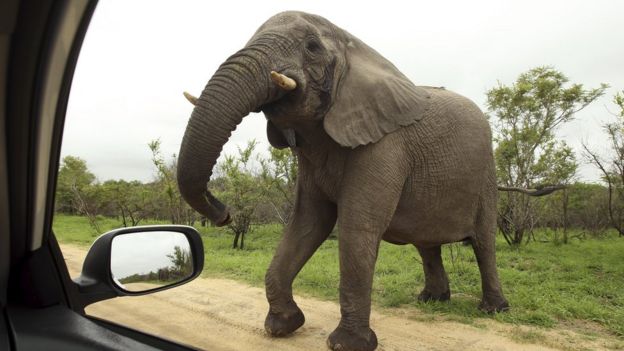
This article is more than
9 year oldA proposal put forward by Kenya was strongly supported but failed to gain the two-thirds majority required.
The opposition of the EU, which voted as a block, was pivotal in the defeat.
Other proposals that would have opened up new ivory markets were also rejected.
Proponents of the increased protection say it is a missed opportunity to safeguard the future of the species and end the current poaching crisis.
African nations have been split on the best approach to conserve elephant populations that have been reduced by around 30% over the past seven years, mainly due to poaching for ivory.
If it hadn't been for the EU we'd have had elephants on Appendix I by now and that would send a massive signal to the world Dr Roz Reeve, David Shepherd Foundation
Many range states that have suffered big losses backed a resolution at this meeting that would see all elephants in every African country elevated to Cites Appendix I, meaning no trade at all is possible in these animals.
Four Southern African countries, Namibia, South Africa, Botswana and Zimbabwe have their elephants listed on Appendix II but with an annotation that prevents any trade in their ivory.

Three of them resolutely opposed the idea of an up-listing as they argue that their elephant populations are doing well and they want to renew the trade in ivory at some point in the future.
In a passionate debate, proponents of the uplisting said it was critical to send the strongest signal possible to poachers that all elephants in Africa were off limits.
Lee White, from Gabon, told the meeting that his country was "haemorrhaging" about one tonne of ivory per month as a result of poaching.
He said that one thousand African park rangers had lost their lives over the past decade in fighting against the illegal trade.
Uplisting all African elephants would send an "absolutely clear" message that the trade must stop.
Botswana made a dramatic intervention, suggesting that they would give up their Appendix II status and rejecting the idea that a trade in ivory could raise funds to protect the species.
"We now realises that we can no longer support sales, we can no longer deal with this in a vacuum," said Tshekedi Khama, Botwana's minister for the environment, wildlife and tourism.
Other southern African states didn't agree. They argued that uplisting depended on science, and that most of the populations in the Appendix II states were growing and not deserving to be on Appendix I.
"Parties must uphold the integrity of the Convention," said South African minister Edna Molewa.
The EU also took this line, stating that the southern African elephant populations didn't meet the biological criteria for uplisting.
This opposition proved crucial: the vote was 62 in favour with 44 against and 12 abstained.
With the EU voting as a block, this meant that their 28 votes went against the proposal and denied the two thirds majority that would put all populations on Appendix I.
Some delegates were not impressed by the European Union approach.
"The fault's at the EU door here, in my view they have the blood of elephants on their hands," said Dr Roz Reeve, senior adviser to the David Shepherd Wildlife Foundation.
"I'm deeply frustrated and ashamed, if it hadn't been for the EU we'd have had elephants on Appendix I by now and that would send a massive signal to the world."
Other proposals to open up ivory markets by Namibia and Zimbabwe were also soundly defeated.
These countries argued that their elephant populations were robust and that their communities were not benefitting from these populations.
"If people are able to benefit from the ivory, they will not poach, they will protect - give us a reason to protect, not fear them," said Charles Jonga, a rural community representative from Zimbabwe.
Following a secret ballot, the Convention decided not to support the proposals.
Follow Matt on Twitter @mattmcgrathBBC and on Facebook.